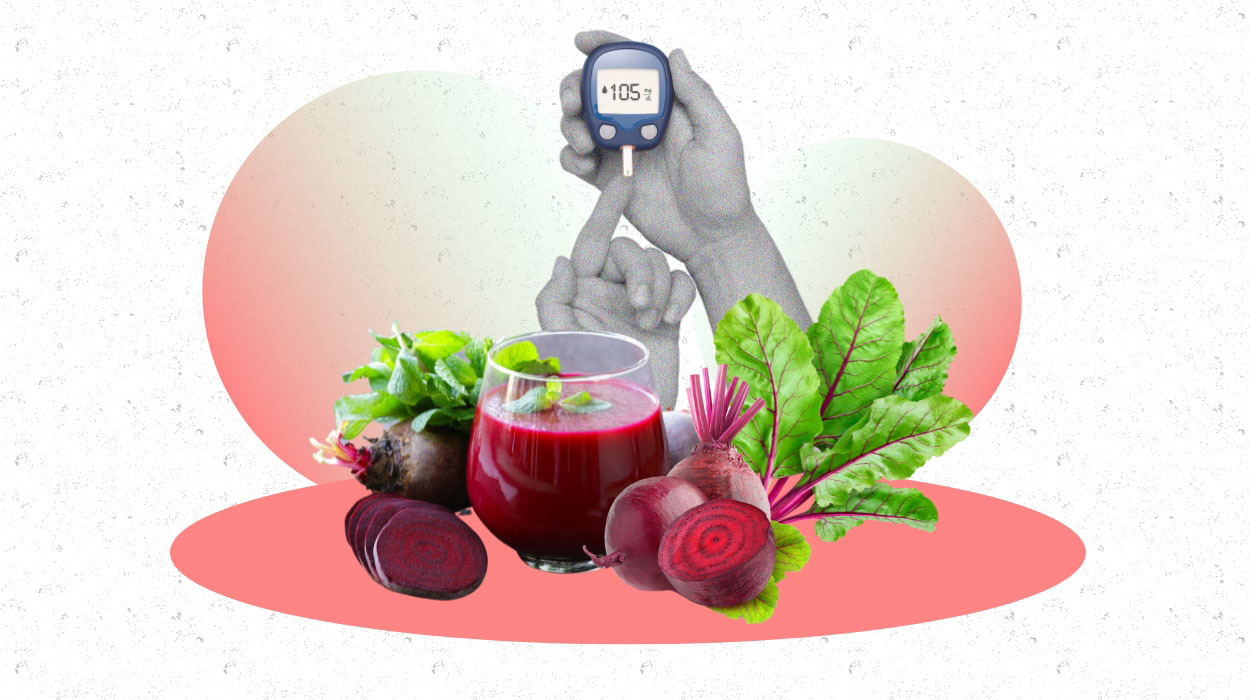 Expert's opinion
Expert's opinion
Expert's opinion
The article is a subjective view on this topic written by writers specializing in medical writing.
It may reflect on a personal journey surrounding struggles with an illness or medical condition, involve product comparisons, diet considerations, or other health-related opinions.
Although the view is entirely that of the writer, it is based on academic experiences and scientific research they have conducted; it is fact-checked by a team of degreed medical experts, and validated by sources attached to the article.
The numbers in parenthesis (1,2,3) will take you to clickable links to related scientific papers.
Beets And Diabetes: Tips To Improve Your Health In 2024

Beets, also known as beetroots, have been popular for centuries. Although not particularly palatable, these vegetables are gradually capturing the attention of health-conscious customers. Typically, root vegetables are consumed in smoothies and other beverages.
Beets are immediately identified by their deep dark red hue. Beyond their distinct appearance, they contain a potent combination of minerals that can help lower blood pressure, increase blood circulation, and control blood sugar levels. The best beet supplement options also contain antioxidants and potent anti-inflammatory properties.
Read on to discover more about the connection between diabetes and beets.
Is Beetroot Good For Diabetes?
Yes. Diabetes and beets work well together because they help manage the condition in the following ways:
- Support cardiovascular health.
- Maintain normal nerve function.
- Regulate insulin production and secretion.
- Body detoxification.
- Weight management.
Beets And Diabetes: Exploring The Benefits
Beets provide various advantages for individuals with diabetes, including
Support For Cardiovascular Health
Diabetes increases the risk of cardiovascular problems such as heart attack, stroke, and coronary artery disease. Beets may reduce this risk by supplying the nutrients required to improve cardiovascular health.
Beets have a lot of folate, a type of Vitamin B9. Folate helps keep the heart healthy and improves glycemic control, especially in people with type 2 diabetes. It also has a lot of potassium and betaine, which help people with diabetes stay away from heart problems.
Maintains Normal Nerve Function
Beetroots are a good source of the nutrients required to maintain nerve function.[1] Beets have a high potassium content, which aids in the healthy passage of electrical signals between cells and organs throughout the body. Increasing nerve function can help prevent diabetes complications, such as muscle tiredness, cramps, renal illness, and irregular heartbeats.
Regulates Insulin Production And Secretion
People with diabetes need to be careful when they have insulin problems including improve insulin sensitivity. Beetroots are well-known for the vital part they play in this important course. These vegetables are high in nitrates and vitamin B6, which aid in reducing insulin resistance.[2] On the other hand, manganese aids in removing sugar from the blood and stabilizing blood sugar levels.
Body Detoxification
Beets allow the body to eliminate toxic chemicals[2] regularly. The root vegetables are strong in bioactive components, such as betalains and dietary nitrates. Each serving raises the concentration of these substances in the body, promoting detoxification and lowering the risk of illnesses caused by inflammation and oxidative stress.
Weight Management
Beets can help people with diabetes control their weight.[3] These root vegetables are low in calories but high in critical nutrients, making them an excellent choice for people who want to maintain or decrease weight while still eating nutritious foods. Beets are also high in dietary fiber, promoting fullness, reducing food cravings, and supporting weight management efforts.
Beetroot Nutrition Facts
Beetroots are a nutrient-dense food considered beneficial due to their anti-inflammatory and antioxidant[4] capabilities. Root vegetables are low in calories but high in other vital nutrients that can support the health of people with diabetes. Natural beet juice is high in the following nutrients,[5] According to the United States Department of Agriculture
Vitamins
Beetroot juice is high in essential vitamins, which are vital for the health of people with diabetes. For example, vitamin B6[6] regulates glucose metabolism and reduces postprandial glucose levels.
Vitamin C[4] is a potent antioxidant that protects the body from oxidative stress and plays a role in diabetes management. Additionally, beetroots contain folate, which aids in the reduction of insulin resistance.
Minerals
Beetroots also contain essential minerals such as potassium, sodium, and manganese. People with diabetes are at risk of developing low potassium levels,[7] which can lead to other chronic conditions. Sodium aids in fluid balance and blood pressure regulation [8], while manganese aids glucose metabolism.[9]
Fiber And Dietary Nitrates
Beets are high in dietary fiber and dietary nitrates as well. Soluble fiber plays a significant role in blood sugar regulation.[10] Soluble fiber is especially beneficial for persons with type 2 diabetes because it slows carbohydrate absorption, reducing the likelihood of blood sugar increases.
On the other hand, dietary nitrates promote cardiovascular health[11] by stabilizing blood pressure, improving blood vessels function, and lowering the associated risks of heart disease.
Betaine
The connection between beets and type 2 diabetes also involves betaine concentration in beetroots. Betaine boosts nonenzymatic antioxidant defenses[12] and aids in the elimination of free radicals from the body. This function aids in the reduction of oxidative stress and inflammation. Such conditions are linked to insulin sensitivity and resistance, cardiovascular issues, and an increased risk of developing non-alcoholic fatty liver disease.
Why People With Diabetes Eat Beets?
Given the complications of the disease, can people with diabetes consume beets? People with diabetes can consume beetroot for the following reasons:
Renoprotective Properties
Studies have shown that beetroot offers renoprotective properties,[13] meaning beets may support kidney function. The dark red vegetable contains a high concentration of bioactive compounds[14] that can help protect the kidneys from injury, which is vital for people with diabetes. Research shows that 20%-40% of those with diabetes suffer kidney complications.[15]
Postprandial Glycemia Cancellation
Because of their high dietary fiber content, beets may help delay the rapid spike in blood sugar levels after a meal. To that end, people with diabetes can utilize beets to promote more stable blood sugar levels over time.
Lowering Blood Pressure
Diabetes is associated with vascular complications and organ damage.[16] Hence those living with diabetes are predisposed to high blood pressure. Beetroot juice aids with dietary nitrate[17] supplementation, which helps manage blood pressure levels and protects the blood-circulatory system.
Natural Dietary Supplementation
If for no other reason, people with diabetes should explore beets for their cost-effectiveness. Beets are far less expensive than synthetic foods. They are among the greatest low-calorie and natural alternatives.
Risks And Warnings
One of the healthiest foods for diabetes is beetroot, and eating root vegetables has hardly any noticeable adverse effects. Still, like any other food, eating beets should be done in moderation to avoid an overload of nutrients.
So, how many carbs are in beets? Approximately 100 grams[6] of raw beets contain around 9.56 grams of carbs. Additionally, each 100-gram portion has 43 kcal. Three-fourths of a cup of beets equals approximately 100 grams.
A 2021 study found that consuming an approximately two-thirds cup of beetroot[18] daily resulted in beneficial glucose metabolism, cognitive function, and other metabolic markers. However, we all have unique nutrition needs. Based on your medical history, talk with your registered dietitian to determine the appropriate amount of beets to eat daily.
It is also crucial to note that beets are high in potassium and, if ingested in excess, can cause hyperkalemia.[19] Excessive levels might result in high blood pressure, irregular heartbeat, and muscular weakness, among other concerns.
How To Enjoy Beetroot With Diabetes
Beets are versatile vegetables that can be eaten fresh, cooked, or pickled. However, most people prefer to eat them raw, particularly in salads or as beet juice. Raw beets are more nutritious than cooked beets and can be consumed after a meal.
Beets have a strong flavor that some people find difficult to swallow. As a result, finding a strategy to boost the flavor is essential. This can be achieved by combining it with other more flavorful foods, such as tasty organic protein.
Cooking is another way to improve the taste of beets and make them more appetizing. Broiled, baked, or sautéed beets are all options. Use the method that cooks them the least to preserve their nutrition. Most people avoid pickled beets because they tend to be less tasty. They are not recommended for diabetes because most pickled beets are high in sugar.
Conclusion
Given the benefits of the root vegetable, beets, and diabetes are a perfect match. Numerous studies back the idea that people with diabetes may benefit from eating beetroot routinely. The food’s mineral and nutrient composition can help support various nutrition needs.
Drinking beetroot juice made from raw beets is often recommended for managing diabetes because it decreases sugar spikes after meals.[20] Beet juice is delicious and nutritious, especially when made from scratch and combined with other fruits. To avoid the stress of selecting between recipes, look up the best meal delivery service near you for people with diabetes.
As one of the finest food options for people with type 2 diabetes, beetroot can protect against and help manage diabetes. It also reduces the risk of developing diabetes-related illnesses, including systolic blood pressure. Consider including beetroot in your diet to reap its enormous potential health benefits. And if you have questions about the role that beets can play in your well-balanced diet, talk with your registered dietitian.
+ 20 sources
Health Canal avoids using tertiary references. We have strict sourcing guidelines and rely on peer-reviewed studies, academic researches from medical associations and institutions. To ensure the accuracy of articles in Health Canal, you can read more about the editorial process here
- Arazi, H. and Eghbali, E. (2021). Possible Effects of Beetroot Supplementation on Physical Performance Through Metabolic, Neuroendocrine, and Antioxidant Mechanisms: A Narrative Review of the Literature. Frontiers in Nutrition, [online] 8. doi:https://doi.org/10.3389/fnut.2021.660150.
- Parvin Mirmiran, Zeinab Houshialsadat, Zahra Gaeini, Zahra Bahadoran and Azizi, F. (2020). Functional properties of beetroot (Beta vulgaris) in management of cardio-metabolic diseases. Nutrition & Metabolism, [online] 17(1). doi:https://doi.org/10.1186/s12986-019-0421-0.
- Behrens, C.E., Khandaker Ahtesham Ahmed, Ricart, K., Linder, B.A., Fernández, J.R., Bertrand, B., Patel, R.P. and Fisher, G. (2020). Acute beetroot juice supplementation improves exercise tolerance and cycling efficiency in adults with obesity. Physiological Reports, [online] 8(19). doi:https://doi.org/10.14814/phy2.14574.
- Clifford, T., Glyn Howatson, West, D.J. and Stevenson, E. (2015). The Potential Benefits of Red Beetroot Supplementation in Health and Disease. Nutrients, [online] 7(4), pp.2801–2822. doi:https://doi.org/10.3390/nu7042801.
- Usda.gov. (2023). FoodData Central. [online] Available at: https://fdc.nal.usda.gov/fdc-app.html#/food-details/169145/nutrients
- Mascolo, E. and Fiammetta Vernı̀ (2020). Vitamin B6 and Diabetes: Relationship and Molecular Mechanisms. International Journal of Molecular Sciences, [online] 21(10), pp.3669–3669. doi:https://doi.org/10.3390/ijms21103669.
- Coregliano-Ring, L., Kleber Goia-Nishide and Rangel, É.B. (2022). Hypokalemia in Diabetes Mellitus Setting. Medicina-lithuania, [online] 58(3), pp.431–431. doi:https://doi.org/10.3390/medicina58030431.
- Baqar, S., Michalopoulos, A., Jerums, G. and Ekinci, E.I. (2020). Dietary sodium and potassium intake in people with diabetes: are guidelines being met? Nutrition & Diabetes, [online] 10(1). doi:https://doi.org/10.1038/s41387-020-0126-5.
- Nih.gov. (2020). Office of Dietary Supplements – Manganese. [online] Available at: https://ods.od.nih.gov/factsheets/Manganese-HealthProfessional/#:~:text=As%20a%20cofactor%20for%20several,affects%20the%20risk%20of%20diabetes.
- Reynolds, A., Akerman, A.P. and Mann, J. (2020). Dietary fibre and whole grains in diabetes management: Systematic review and meta-analyses. PLOS Medicine, [online] 17(3), pp.e1003053–e1003053. doi:https://doi.org/10.1371/journal.pmed.1003053.
- Bondonno, C.P., Frederik Dalgaard, Blekkenhorst, L.C., Murray, K., Lewis, J.R., Croft, K.D., Cecilie Kyrø, Torp‐Pedersen, C., Gislason, G., Tjønneland, A., Overvad, K., Bondonno, N.P. and Hodgson, J.M. (2021). Vegetable nitrate intake, blood pressure and incident cardiovascular disease: Danish Diet, Cancer, and Health Study. European Journal of Epidemiology, [online] 36(8), pp.813–825. doi:https://doi.org/10.1007/s10654-021-00747-3.
- ACS Publications. (2016). Antioxidant Mechanism of Betaine without Free Radical Scavenging Ability. [online] Available at: https://pubs.acs.org/doi/10.1021/acs.jafc.6b03592
- Parvin Mirmiran, Zeinab Houshialsadat, Zahra Gaeini, Zahra Bahadoran and Azizi, F. (2020). Functional properties of beetroot (Beta vulgaris) in management of cardio-metabolic diseases. Nutrition & Metabolism, [online] 17(1). doi:https://doi.org/10.1186/s12986-019-0421-0.
- Iñaki Milton-Laskíbar, J. Alfredo Martínéz and Portillo, P. (2021). Current Knowledge on Beetroot Bioactive Compounds: Role of Nitrate and Betalains in Health and Disease. Foods, [online] 10(6), pp.1314–1314. doi:https://doi.org/10.3390/foods10061314.
- Gheith, O., Farouk, N., Nampoory, N., Halim, M.A. and Al-Otaibi, T. (2015). Diabetic kidney disease: world wide difference of prevalence and risk factors. Journal of nephropharmacology, [online] 5(1), pp.49–56. Available at: https://www.ncbi.nlm.nih.gov/pmc/articles/PMC5297507/#:~:text=Diabetic%20kidney%20disease%20%E2%80%93%20which%20is%20defined%20by,occurs%20in%2020%25%20to%2040%25%20of%20all%20diabetics.
- Rask‐Madsen, C. and King, G.L. (2013). Vascular Complications of Diabetes: Mechanisms of Injury and Protective Factors. Cell Metabolism, [online] 17(1), pp.20–33. doi:https://doi.org/10.1016/j.cmet.2012.11.012.
- Kapil, V., Khambata, R.S., Robertson, A., Caulfield, M. and Ahluwalia, A. (2015). Dietary Nitrate Provides Sustained Blood Pressure Lowering in Hypertensive Patients. Hypertension, [online] 65(2), pp.320–327. doi:https://doi.org/10.1161/hypertensionaha.114.04675.
- Mitra Aliahmadi, Amiri, F., Leila Sadat Bahrami, Agha Fatemeh Hosseini, Behnaz Abiri and Mohammadreza Vafa (2021). Effects of raw red beetroot consumption on metabolic markers and cognitive function in type 2 diabetes patients. Journal of Diabetes & Metabolic Disorders, [online] 20(1), pp.673–682. doi:https://doi.org/10.1007/s40200-021-00798-z.
- Hunter, R.W. and Bailey, M.A. (2019). Hyperkalemia: pathophysiology, risk factors and consequences. Nephrology Dialysis Transplantation, [online] 34(Supplement_3), pp.iii2–iii11. doi:https://doi.org/10.1093/ndt/gfz206.
- Wootton-Beard, P., Brandt, K., Fell, D.A., Warner, S. and Ryan, L. (2014). Effects of a beetroot juice with high neobetanin content on the early-phase insulin response in healthy volunteers. Journal of Nutritional Science, [online] 3. doi:https://doi.org/10.1017/jns.2014.7.



